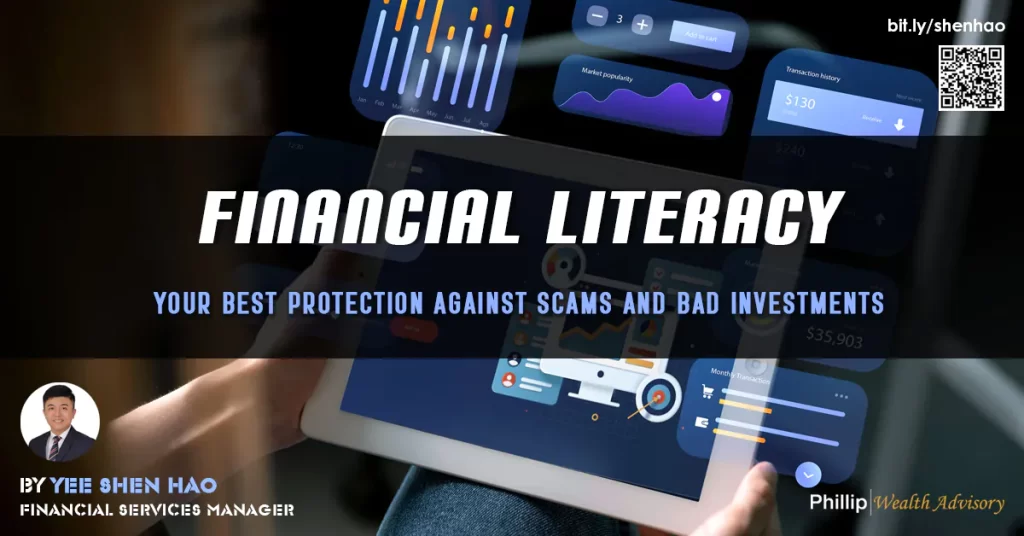
This article first appeared on POEMS website.
In recent years, the rise of robo-advisors and low-cost DIY trading platforms, often offering attractive sign-up promotions such as free shares and referral perks, has made it easier than ever for investors to access a wide range of financial instruments. These include stocks, ETFs, unit trusts, options, forex, commodities, CFDs, and more, all just a few clicks on mobile apps.
While these platforms have helped to democratise access to financial instruments for the average retail investor, eliminating the need for traditional brokers, the convenience of digital platforms has also increased the risk of making poor investment decisions driven by fear, greed, or misinformation. Worse still, it has opened the door to investment scams.
According to the Singapore Police Force1, scam victims in Singapore lost a total of S$651.8 million in 2023, with young adults being the most vulnerable. This figure is in addition to the losses from the collapse of cryptocurrencies like Luna and TerraUSD, as well as major cryptocurrency platforms such as FTX in 2022. The resulting ‘crypto winter’ wiped-out billions of dollars for investors, many of whom were young, first-time investors from the Millennial and Gen Z generations. Older investors may recall the infamous gold buyback schemes like The Gold Guarantee and Genneva Gold, between 2011 and 2015, which turned out to be elaborate Ponzi schemes.
Nowadays, questionable investment products are also being promoted on social media apps through targeted advertisements and sponsored posts, often marketed as ‘limited offers’ or ‘rare gems’ that promise high returns with low risk.
While seasoned investors may be able to do the math and see through the hype, the reality is that many investors in Singapore lack the fundamental knowledge needed to evaluate the risks of many financial products or to assess the reliability of online financial content.
In 2023, the Sustainable Investment Survey, jointly conducted by the Singapore Management University (SMU) and the Global Financial Literacy Excellence Centre 2, revealed that 60% of Singaporeans aged 23 to 86 were unable to correctly answer all of the ‘Big Three’ financial literacy questions, which focus on interest, inflation, and risk diversification. Without a solid grasp of these basic financial principles, it is unlikely that the average investor can effectively evaluate financial instruments or navigate the various finance contents online.
Given these considerations, I would argue that the best strategy to safeguard our own financial interests is to become more financially literate. Here are three practical tips on how you can improve your financial literacy and make more informed investment decisions:
#1 Attend Financial Literacy Courses
One of the best ways to enhance financial literacy is by actively seeking out financial educational programmes offered by reputable institutions or educational organisations.
Singaporeans aged 25 and above can utilise their SkillsFuture Credits to attend courses provided by independent organisations, covering a wide range of topics, from the principles of money management and budgeting, to investing and retirement planning.
Timeless financial concepts that everyone should aim to master include:
- Compound Interest
- Time Value of Money (TVM)
- Inflation and its effects on interest rates
- Types of Risks and Diversification
Beyond these basics, it’s essential to learn how to calculate the Internal Rate of Return (IRR) for different cash flows over time, using simple yet powerful Microsoft Excel formulas like ‘IRR’ and ‘XIRR’ (Extended Internal Rate of Return). Mastering these concepts, will equip you to evaluate the actual net-of-fee returns of any financial product offered by your financial advisers, bank relationship managers, insurance agents, or investment professionals.
#2 Stay Updated on Financial News
After learning the timeless concepts, staying informed on current finance-related news is crucial. Major events such as the annual Budget by the Ministry of Finance (MOF) as well as major announcements by the MAS, CPF Board, the US Federal Reserve, and updates on macroeconomics and geopolitics can significantly impact financial markets. Additionally, be vigilant about the ever-changing tactics used by scammers. With the rise of AI, scammers can now easily produce deepfake content promoting investment scams on various social media platforms.
Another option is to follow independent financial influencers, or ‘finfluencers’ who promote finance content globally. In recent years, movements such as the Financial Independence, Retire Early (FIRE) Movement from the US, and 1 Million by 65 (1M65) Movement in Singapore have gained prominence, offering valuable insights to help followers increase financial literacy.
However, it’s essential to critically assess the content for mathematical accuracy and objectivity. Many finfluencers rely on third-party compensation, which might introduce bias or conflicts of interest, even if posts are not explicitly sponsored.
Therefore, while consuming timely finance content, it is important to always cross-reference multiple sources before acting upon them for financial decisions.
#3 Seek Professional Advice from Licensed Finance Professionals
Once you’ve expanded your knowledge, you may also consider seeking professional advice from a licensed and well-trained finance professional. A skilled advisor can act as your personal trainer in financial literacy, offering unbiased, personalised guidance tailored to your specific financial goals, risk tolerance, and circumstances.
While many DIY investment platforms provide self-guided questionnaires to help clients choose the “best option”, these standardised questionnaires, limited by their template, often overlook the nuances of each client’s financial goals. In my experience, clients truly value the personalised guidance and support that professionals provide.
Even with the rise of AI, DIY platforms, and a wealth of online finance content, a well-trained, licensed finance professional still plays an important role in navigating the complexities and uncertainties of the financial markets.
CONCLUSION:
As Warren Buffet once famously said, “If you don’t understand it, don’t invest in it. If you can’t explain it simply, you don’t understand it well enough.” In finance, knowledge is power. Elevating our financial literacy empowers us to evaluate the quality of financial content that we consume, helping us avoid online scams, misleading advice, and poor investment products that may seem attractive but pose hidden risks. A trusted finance professional can be your strongest ally against scams, offering personalised guidance to steer you in the right direction.
Reference:
- https://www.businesstimes.com.sg/singapore/scam-victims-singapore-lost-s6518-million-2023-record-high-cases
- https://g53network.org/wp-content/uploads/2023/06/SCONTI_G53.pdf
Originally posted on:
![]()





